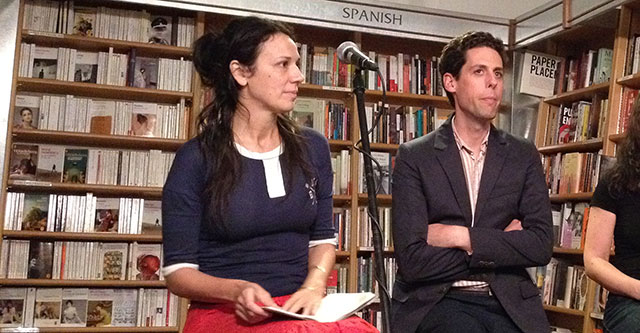
In 2010, The New Yorker named Rivka Galchen one of their 20 under 40 following the publication of her 2008 novel, Atmospheric Disturbances. She read from her new collection of stories, American Innovations (May 2014) at McNally Jackson. Rebecca Curtis joined Galchen to discuss short stories, inspiration, and process with New Yorker editor Willing Davidson.
Davidson begins the evening by describing the writing of both women as funny, but, he says, “the humor is not jokes.” Curtis reads “The Christmas Miracle” and Galchen “The Late Novels of Gene Hackman,” both appearing in issues of The New Yorker last year. Davidson is right. Both women are indeed funny, and the humor comes from the unexpected and the odd rather than a jokes. The popular press, Davidson continues, has discussed Galchen’s inspiration coming from other stories.
Galchen mentions Roberto Bolaño’s The Last Evenings On Earth as inspiring “The Late Novels of Gene Hackman.” The novel was menacing and gloomy. The fantasies of violence and the very male relationships were something she wanted to examine. The portrayal of the relationship of father and son intrigued her, and she wanted to look at the dynamics of an older woman and younger woman.
As to Gene Hackman’s novels– he actually has written several. She knows this only because “you lose your life on Wikipedia.”
Davidson turns to to Curtis and asks about her interest in Lyme Disease, an affliction many of her characters suffer.
Its a complicated disease, she says, and one with neurological problems. Its a good excuse to have characters who a little bit crazy. She says that well balanced characters need to have something happen to them to get to that weird place. But an unbalanced character arrives at that weirdness immediately–they are easier to justify odd opinions or behavior. “Its a way to have an unbalanced character that makes sense,” she says.
George Saunders writes stories. Even when he starts out thinking he will write a novel, he ends up truncating the text into a story, Davidson says, segueing into asking both authors why they prefer stories.
Galchen says that stories make sense to her. “It is the form I’ll read again and again and again.” How many times can you read a novel, she asks rhetorically.
“Short stories are really hard,” she says.
Curtis disagrees saying that she thinks stories feel easier. Novels, she says, need a big idea to sustain them. But a story can be something smaller, some smaller action. Her example is making toast. Making toast can be a story, but not a novel. “You can write a story in a day,” she adds.
“I think you can see the structure more if its small,” Curtis says. A story’s strength is its limited size. She adds, “Its easier to see the whole thing.”
Davidson asks whether its easier to write a short story after writing many. Writers, he says, are never going to write fifty novels, but fifty stories, almost certainly.
“I might write fifty novels,” Curtis responds with defiant laughter.
Galchen answers the question: experience is unhelpful because then the story has been used up once already. Trying to do the same story again feels fatigued and tired, she adds. “Things get interesting when they surprise me.”
“I’m happy to use the same structure over again,” Curtis says. She’ll write structured like letters, as though writing to a distant relative she may not know well, but wants to relate a story to. She says she is always trying to write in third person, but feels she is terrible at it. So anything that helps her frame a story that way is useful to her.
Davidson asks about introducing reality into texts–specific details like Gene Hackman’s novels–and the effect of that on the story.
Galchen says she likes reality because its resistant to the author. There are real world properties that provide limits. “When things come from reality, they resist you.” She says that the real world pushes around the author’s ideas.
There are plenty of places she draws concepts and knowledge from. She reads newspapers. Growing up, she says, she watched eight or nine hours of television every day. “It felt like that was real,” she says, saying that her real life felt more distant. She loved cross-show cameos because they made it feel like the world on these shows was boundless.
“I aspire to read the newspaper more,” Curtis says. But she also takes biography from other people. She totally wholesale borrows real stories from people. “I’m just kind of amoral,” she jokes.
Some things become more interesting in a fictional setting, Galchen adds.
Both authors talk about turning off the front of the brain. Curtis says the goal is to that “you’re trying to reach the child sensibility,” because of the kind of freedom that comes from that.
The front brain has to be efficient, Galchen says. It blocks out details in order to achieve that efficiency.
When it comes to process, Galchen says she works really slowly. She will send drafts to Davidson who offers her feedback. She describes it as the “does my butt look good in these jeans” process. There seems a sense of uncertainty about her writing, she worries about mistakes. “Its only really late in the game that I feel on top of [the story].” She describes her physical process as writing on the computer, printing out drafts, and making notes on the paper.
Curtis writes longhand, types everything, and then edits. She says she tends to workshop her stories. Her first workshop group fell apart when some of the writers finished their books. She needed another group. She showed up at the reading of a writer she knew declared that they were starting a new workshop group. “Its about insult and manipulation,” she says.